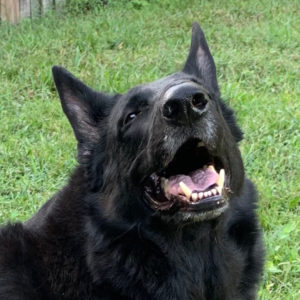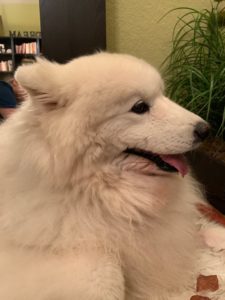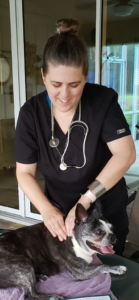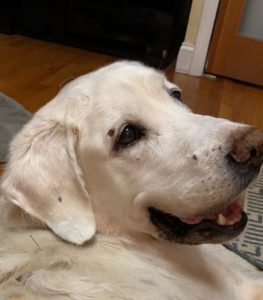How Can a Holistic Vet Help a Senior Dog?
What is a Senior Dog?
First of all, let me say, it drives me batty when a dog is considered “senior” at 7 years old. Why is that senior?
In this post, guess the dogs’ ages from their pictures (answers at the end of the post):
Pet food manufacturers called it “Senior 7 and up” or “Senior 8 and up.” We also know that, in general, at about 7 years old, blood work (complete blood count and chemistries) on an apparently healthy pet with spike in abnormalities that benefit from changes how we care for these pets. Does that mean your dog is senior at 7 years old? Likely not. So much depends on their breed(s), health of the parents, early puppy hood nutrition and health challenges, accidents (luck?) and lifestyle like sports activities. A senior dog might be an older dog that is slowing down, feeling tired, less stamina, more chronic illness like arthritis.
Individual situations vary. If your dog is a giant or large breed, they might become senior at 4-6 years old (Great Danes, we’re thinking of you.) If they are a Chihuahua or Yorkie, maybe 10-12 years old. A Labrador Retriever is prone to hypothyroidism as young as 2 years old and should not wait until 7 years old to be tested.
Tru Tip:
Senior dog should be decided on an individual basis with the help of a family veterinarian who ideally knows your dog well. Senior dog could be at 4 years old for a Lab with hip dysplasia or 9 years old for a Beagle who is getting pot-bellied and all the tests are ‘normal.’
Why do We Care if We Have a Senior Dog?
The assumption is that a Senior dog will need more care and attention to health and quality of life issues. This is a strange concept. Dogs of all ages deserve focused veterinary care and attention. As much as possible, veterinary science searches for valuable interventions that can make a difference for your dog. For example, should a 2-year old healthy dog have a yearly full thyroid panel? If the dog is an American Pit Bull Terrier, probably no. If the dog is a Labrador, probably yes because research shows Labradors are prone to hypothyroidism as young as 2 years old. A designation as a Senior dog could give a pet owner the confidence that increased testing and more frequent veterinary visits are financially justified.
You may need more time and attention with your veterinarian than you are currently receiving, no matter your dog’s chronological age.
We Want Our Senior Dogs to Have the Best Quality of Life Possible
Why do we start monitoring quality of life scales once there are problems and we are worried about our dog’s enjoyment of life? Why haven’t we been assisted by our veterinarians to monitor this throughout life? At what point did your dog start feeling Senior? Or at what point will your younger, lusty dog start aging? Will you notice it right away or after several years of wear and tear? Veterinarians should help pet parents with these observations.
Doc Truli adds quality of life scales to every comprehensive examination. Why not? It takes seconds and may show the start of a downward trend years before your pet is sick enough for an official diagnosis.
If My Dog is a Senior Dog, What Can I Do About It?
Once you either have decided to screen your dog for senior-type issues or you know they already have issues, veterinarians have many, many tools to help you with your dog’s care and management. The marketing people who made Senior Pet Month are advertising “ask you vet about diet, exercise and devices to help your Senior Dog’s comfort care.” This is good starting advice. Your veterinarian has been trained to offer prescription diets for issues like joint mobility, cognitive decline, or obesity. Veterinarians can advise you about how often and how far to walk your dog. They can also advise you about dog carts, lift harnesses and the like. These are all helpful Senior dog tips. They are also mostly generic and easily learned from Dr Google. How do you get more out of your veterinarian?
Tru Tip:
Veterinarians can become Certified in the new field of Palliative and Hospice Care for Pets. This does not mean they think your dog is going to die soon. This means they have learned solid science from human experience and can apply the concepts and tips to help your dog live a longer, happier life. Look for veterinarians with these types of certifications for enhanced options. Doc Truli achieved the Certified Traditional Chinese Veterinary Medicine Palliative and Hospice Care certification as soon as it was offered in early 2019.
Food Matters SOOOO MUCH!!!!
You need the best quality nutrition you can manage for your dog. Not just the Senior dog, but any dog can benefit from a nutrition enhancement consultation. Board Certified Veterinary Nutritionists are rare specialists in animal nutrition. They generally work for pet food companies or universities. Since they are practicing medicine, they need to consult with you and your pet in person in order to advise you. There is another way to get expert pet nutrition advice.
Your veterinarian can consult with nutrition specialists remotely and then advise you. Nutrition consults are personalized custom services and time consuming. Expect your veterinarian to charge for this time. The results are astounding when your pet responds to proper and personalized nutrition advice. Dr Truli spends 50% of her appointments consulting about nutrition. She s well-versed in what works and what doesn’t work for families with Senior dogs.
Doc Truli’s Hierarchy of Food Improvement
Base Level: AAFCO as formulated dog food for your dog’s life stage: All, Lactation, Gestation, Adult, Senior. Example: most dog foods in the pet supply chain. Read the label.
Level 1: AAFCO as fed dog food. Example: most Science Diet formulations (read the label claims to be sure)
Level 2: Base or Level 1 with fresh cooked real-food toppers <10% of total under veterinary supervision
Level 3: Fresh home-cooked balanced diet made following a recipe formulated by a veterinarian trained in nutrition or consulting with a specialist.
Level 4: Level 3 with herbalist and food-as-medicine trained veterinarian guiding the ingredient list more specifically to assist healing your pet based on their unique diagnoses
Custom issues that can be good or bad, depending how you are implementing them: Raw food diets, Raw Meaty Bones, 80-10-10, Dehydrated organ meat treats, grain-free diets. Dr Truli consults abut them all!
A Final Note About Healing a Senior Dog
We expect to see visible results in your dog’s fur within a week of starting an effective plan. If we do not, we adjust and change up the plan.
Doc Truli says, “I believe in results-based medicine. This means we make plans and implement treatments that you can tell are helping your pet. I do not believe in doing medications or herbal treatments because it should theoretically be helpful. I want to know and see it is helpful. Any pet parent should see and feel the difference a treatment makes, even if they are not a trained medical professional.”
How Do I Make an Appointment for my Senior Dog?
Dr Truli is available in the Greater Tampa Bay area to come to your home and provide you with a comprehensive evaluation and treatment plan for your Senior dog. You can expect written reports detailing diet, exercise, behavior and mental health. Physical exam included orthopedic, neurologic, dermatology like a specialist exam (without going to all those specialists.) Chinese Medicine pulse and tongue diagnosis like your acupuncturist does for you.
Dr Truli works with your family veterinarian and can use their laboratory results or Dr Truli can be your primary veterinarian if you do not prefer the hospital environment for your Senior dog. Common Senior dog laboratory tests including CBC/Chem/thyroid, cortisol, Vitamin D/B/Magnesium and Calcium are helpful for health care of all dogs. Senior dogs especially benefit from early cancer screening test with TK1 and C-reactive protein (new technologies recently available taken from human medicine.) Doc Truli routinely performs these tests and knows how to advise you to take action based on the results.
Whether you want a comprehensive plan to help guide your Senior dog’s care or you value regular weekly or monthly hands-on therapy and evaluations in your relaxing home environment, Dr Truli can help your Senior dog have happy and optimized golden years.
Call, text or email your name, your pet’s name and situation, your wish for an ideal appointment time and day and your address for checking schedule availability. Phone (877) 378-7854. Phone/Text 813-714-7863 or email DrTruli@VetVMD.com
Read Dr Truli’s credentials credentials here
Read Dr Truli’s client feedback/reviews reviews here
Read payment and business policies here
Dr Truli Client Agreement 2019
Answers: Yorkie is 15 1/2, Merlin GSD is 7y, Samoyed is 12 1/2, Bostie is 13
How close did you get?
Did you know 25% of human women go gray in their 20’s? And Merlin’s muzzle went gray when he was 1 year old. It is genetically programmed, not necessarily age-related!
Bonus:







